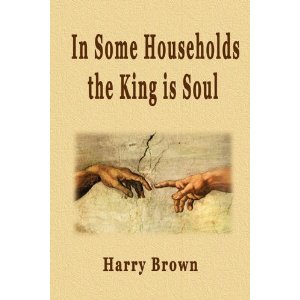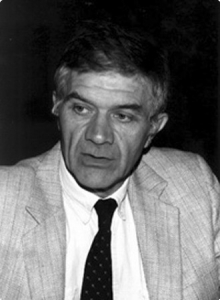 Harry Brown’s In Some Households the King is Soul is a collection of poetry celebrating the human spirit. Brown’s eclectic variations of form invite you to travel along with the poet, musing in thought and recollections of God, nature, and family. Brown’s poems, similar to his previous collection, Felt Along the Blood, unearth the poet’s connection to the cosmos; however, the poems have a touch of final wisdom—as if the poet has come full-circle, transcending his own truths. With metrical precision and rhythmic playfulness, the poet, comparable to Walt Whitman, questions his own revelations and is forthright with self-contradictions.
Harry Brown’s In Some Households the King is Soul is a collection of poetry celebrating the human spirit. Brown’s eclectic variations of form invite you to travel along with the poet, musing in thought and recollections of God, nature, and family. Brown’s poems, similar to his previous collection, Felt Along the Blood, unearth the poet’s connection to the cosmos; however, the poems have a touch of final wisdom—as if the poet has come full-circle, transcending his own truths. With metrical precision and rhythmic playfulness, the poet, comparable to Walt Whitman, questions his own revelations and is forthright with self-contradictions.
Brown’s collection is divided into five segments, the first titled “smörgåsbord,” which establishes the nineteenth century Romantic tone with a touch of down home southern appreciation. “BRAHMIN” states that “Those who know / say Thor’ eau.” Wit is carried on in section two with “God is All Ears.” Exact diction and syntax are indicative of the poet’s reverence: “Blessed / it is / to listen; / divine, / to hear.”
As a true Romantic, Brown places emphasis on sensibility. And although he is an esteemed foundation professor of English, Brown values the heart over the mind in part III, homily: “I hold no zeal on matters epistemological. / When friends, however, stare me down to make me stand, / I hotly shout “Heart !” with reason for my passion” (“In Equal Parts”). Imagery and powerful action verbs animate nature in part IV, farm. Confessional verse takes you to Brown’s beloved Paint Lick farm where he communes with nature and his children. “Becoming Cow; Or, Eternal Arrival,” is a meditation on birth, cataloguing the magnificent event from the beginning, “Snout and jaws first through, / next a thin mask shows skin tight over forehead and eyes, the shy rest hid inside a large heaving oven, / a black volcano straining”—to the end where the mother cow is central focus: “standing in the morning sun surveying in sibylline / silence the west pasture, unaware in her solitude / that the herd lying together in the east meadow / as on every other morning as this hour / lounge and chew and stare, looking off into.…”
In “Song of Myself,” Walt Whitman says, “I am not stuck up and am in my place.” Harry Brown’s honest voice sooths the ear with allusive poems in part V, folks. Emily Dickinson, Arthur Miller, Shakespeare, among other great predecessors travel alongside the poet in spirit as he ponders life’s enigmas. In the poem “Andy,” Brown asserts, “they should give of horizon only in every direction / but back to andy / I’d add our minds are seers / for early fear of giving / predicts the grown soul.” Emily Dickinson believes “The Brain—is wider than the Sky—,” and In Some Households the King is Soul, Brown’s heart is more expansive than a body of water, overflowing with spontaneous emotion—river deep.
Deana Nantz holds an MFA in creative writing and an MA in literature from Eastern Kentucky University where she currently teaches modern drama. She also teaches high school English and writes poetry and fiction. Her poetry has been featured in Paradigm and an interview she conducted with Chris Offutt is in the latest edition of Jelly Bucket.





